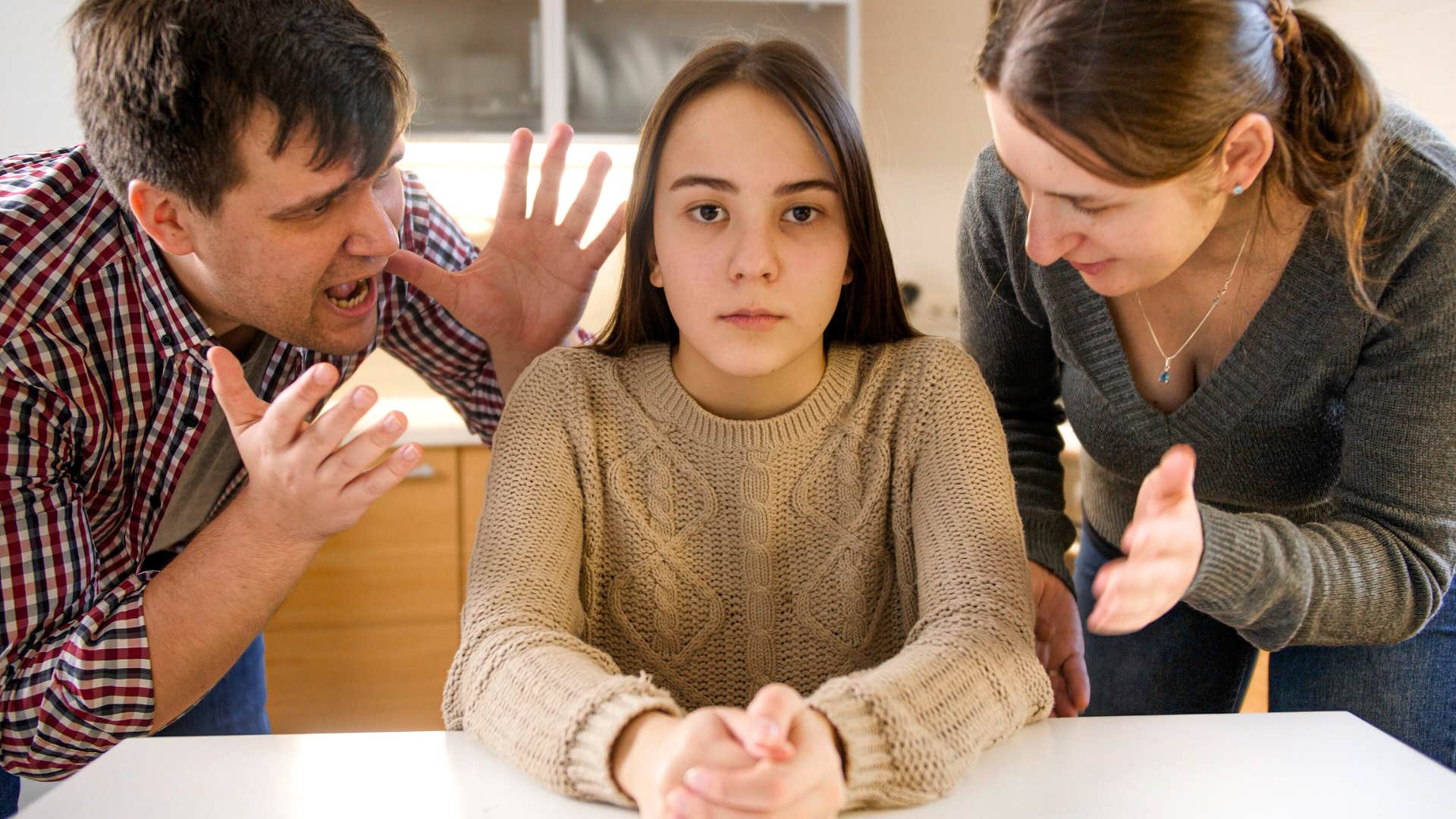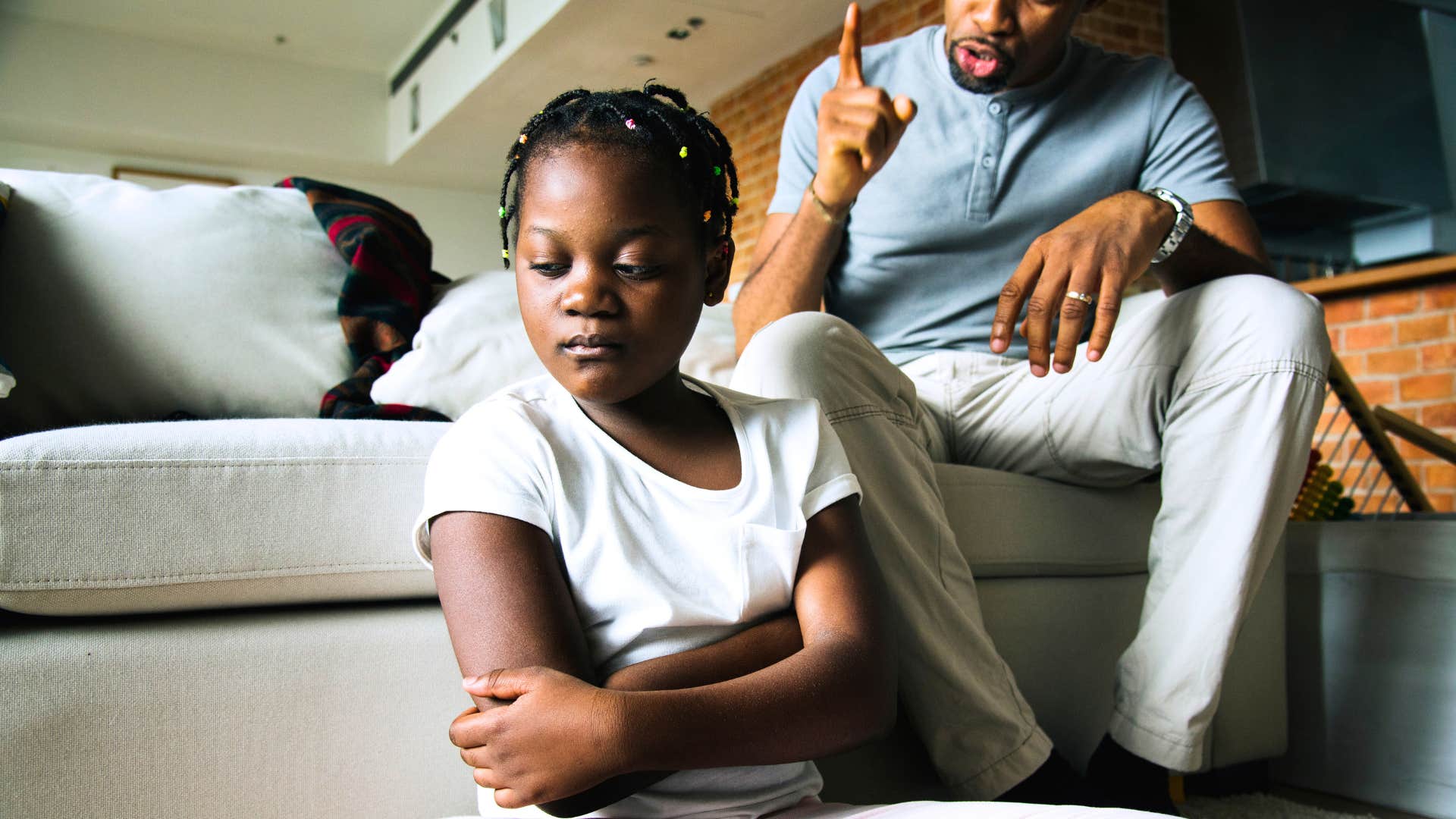11 Signs You Were Raised By A Bad Parent & It's Affecting You Now
When the past impacts the future.
 Freeman Studio | Shutterstock
Freeman Studio | Shutterstock When you have a child, your entire life changes. Suddenly, everything is for the baby. Every parent wants to be able to do right by their kids. But there are many things that stand between you and being not a good parent, but the kind of parent your child needs. That's the right way to look at it; good and bad are relative. But all kids need approximately the same thing in order to grow into happy, healthy, successful human beings.
Parents neglect to give their kids what they need for a lot of reasons. I've seen parents read so many parenting books that they end up not knowing which way is the right way. I've also seen parents who just don't care, letting their kids do whatever they feel like, or, even worse, neglecting and abusing them. One thing is for sure: there are a number of truly toxic parenting behaviors that imprint on our kids and deeply, profoundly impact their lives growing up. These are habits and actions that you should avoid at all costs. Some are physical, some psychological, and some are social.
Here are 11 signs you were raised by a bad mother or father, and their bad parenting affects you as an adult:
1. They never respected boundaries.
 AstroStar | Shutterstock
AstroStar | Shutterstock
It's important for parents to think about the boundaries they've set for their children.
When I was young, my parents established some very important boundaries: Stay out of the parents' bedroom. Stay out of mom's office. Stay out of Dad's man cave.
There were good reasons for those rules! You're adults; you own adult things. You don't want kids getting into that!
But kids also have things they don't want you to get into, too. You can't expect kids to feel like respected individuals if you also don't honor their personal space and their boundaries, too.
When your kids get older and into their teen years, you should not be snooping. They don't go through your underwear drawer, you shouldn't go through theirs either.
They're old enough that simply talking to them about worries you might have is good enough. Use your words. Don't be intrusive.
Research from Stanford University shows that when parents don't respect their children's boundaries, it can lead to self-regulation and emotional management difficulties that persist into adulthood. Just as you wouldn’t want your kids rummaging through your private spaces, they need their boundaries honored to feel respected and develop independence.
2. They didn't provide affirmation and security.
 Natalia Deriabina | Shutterstock
Natalia Deriabina | Shutterstock
A lot of parents, stereotypical macho dad types especially, think that punishment is king. It takes tough love to shape and sculpt young boys into strong, capable young men.
But tough love isn't how you make sure your kids can take care of themselves. Teaching them to take care of themselves is how you teach them to take care of themselves.
Simple, right? By punishing your children over every little thing, you cripple their ability to be strong in the face of life's challenges, because any sign of failure will be met with swift... something. Not punishment, but... something. Disappointment. Frustration. Anger. Withholding.
We should be teaching our kids about the world as an adult. When you're an adult and you fail at something, you don't have some authority figure that takes away your Gameboy until you do better.
You try harder to do better, and that comes from within.
3. They were overly critical.
 fizkes | Shutterstock
fizkes | Shutterstock
We all have dreams and goals that we don't achieve. Maybe you wanted to be a football star, but you tore your ACL in high school, and all that went out the window. Maybe you were almost the math league champ but didn't quite make it.
One thing is for sure: you should not be projecting your failures onto your children. You can't force your kids to be something that you wish you were. When you do that, you crush their self-esteem.
When you project what you want for your kids onto them without letting them choose, and when you level unrealistic expectations, you don't make them better or stronger. You make them weaker and less likely to be empowered with the tools to take on the challenges of their adult lives.
4. They didn't follow through.
 Lordn | Shutterstock
Lordn | Shutterstock
Parents want to be their kids' best friends. But that's not what kids want.
You don't want to unintentionally raise a terrible adult, and one of the ways you avoid that is by setting rules and actually following through with them.
If you're a new parent, it's good to experiment a little to see what works and what doesn't. But at some point, you have to see what guidelines and rules work and actually follow through on them.
A 1989 study by Patterson and colleagues found that when parents don't follow through on rules, children may develop habits like defiance or impulsivity that carry into adulthood. Consistent guidelines, even when tough to enforce, help kids build self-discipline and avoid negative patterns that can shape a 'terrible adult' down the line.
No parent wants to punish their kids. No parent wants to tell their kids what's what and see those tears well up.
But you need to be able to not manipulate but adjust the mindset of your kids through these guidelines. You don't want to crush bad habits but develop and incentivize good habits.
5. They didn't give you space.
 kryzhov | shutterstock
kryzhov | shutterstock
As your kids get older, they need more space from you. This is an important part of growing up.
At some point, you have to stop telling them what to do and you have to stop doing important things for them. You can't do their homework. You can't write their college entrance essay.
At some point, you need to look at your kids and say, "Figure it out. I'll help if you need me too." But even then, make sure that you're not doing any of the figuring out for them. Be ready to let your "baby" go when they know they need to figure things out on their own.
Parents who deeply love their kids find it hard to let go the part of their life where mommy and daddy are crucial for every little thing. But to impose yourself long after that kind of parenting is needed is wrong.
6. They lived to serve you.
 Rawpixel.com | Shutterstock
Rawpixel.com | Shutterstock
You should have a strong sense by now that the right form of parenting is somewhere in the middle of both extremes. You don't want to throw your kids to the wolves, but you also don't want to serve them.
When your kids are old enough to learn to cook, teach them to cook. When your kids are old enough to do laundry, have them do laundry. When your kids are old enough to drive, for God's sake, teach them to drive.
It is important that you don't pamper and serve your kids forever. They need to learn vital skills to maintain themselves as adults.
One of the things I find myself bemoaning the most is how much skill has been lost between my grandparents and me. There are a lot of skills they had that I just didn't have instilled in me.
It's important to give your kids the knowledge that you were given, and pampering them won't teach them anything good.
7. They threatened or intimidated you.
 Just Life | Shutterstock
Just Life | Shutterstock
It's frustrating dealing with the little things with your kids.
They often become afraid and unsure of things that are simple and second nature for you. They don't always succeed at self-control, which can be endlessly difficult for a parent simply trying to parent the right way.
But what you absolutely can't do is level threats. For example: "If you don't _____, then _____," or, "If you ever ____, this is what's going to happen to you."
Under this kind of authority, you've completely destroyed your child's confidence in you. They won't feel like they can come to you for help because a threat has been leveled, and this is one of the major signs you were raised by a bad parent.
How can you really talk to a person candidly and honestly about something you're going through if you feel like the result is going to be a punishment of some kind?
A 2012 study in Pediatrics found that children raised with threats or harsh discipline, like being told ‘If you don’t, then…,’ were more likely to face anxiety and depression as adults. This type of parenting undermines a child’s confidence and leads them to feel they cannot turn to their parents for help, a fear that lingers for many well into adulthood.
8. They were helicopter parents.
 Andriiii | Shutterstock
Andriiii | Shutterstock
The millennial generation will tell horror stories of helicopter parenting. Check out any Reddit thread about helicopter parents and you'll see the carnage they leave behind in the form of adults who don't know up from down and left from right.
A 2013 study found that college students with helicopter parents felt less capable of handling life's challenges, often grappling with anxiety and a lack of independence. Like many millennials share on social media, this overbearing parenting has left them unprepared for adulthood, lacking the skills this generation needed to thrive.
When you have a baby, you have to do everything for it. You have to do everything in your power to care for it and make sure it survives. But you have to let some of that go as time goes by.
You have to honor their mistakes and appreciate their successes and let them grow into independent people. If you don't, you've raised an adult who doesn't have the skills necessary to succeed on their own.
9. They never listened to you.
 Rawpixel.com | Shutterstock
Rawpixel.com | Shutterstock
I'll let you in on a secret: kids aren't stupid. They can read sarcasm and tell when you're condescending and not listening to them because you think they're just some dumb kid.
Parents: you need to listen to your kids. It's hard to find value in the babble they sometimes send off into the world through their faces, but it doesn't matter.
When you listen to your kids, and I mean really listen, it tells them that they're unique individuals who have something to offer this world that we're living in.
True, a 4-year-old probably won't ever have something particularly compelling to say to you, but that doesn't mean you shouldn't show them that what they say is important, because it actually is. Stuff that seems mundane to you might be absolutely mind-blowing to them.
If a child tells you that she saw a brown dog that day, hear what they're saying. That may be a first for them. They want to talk about the incredible experiences they have the same way you do. Listen to your kids.
10. They were lazy.
 fizkes | Shutterstock
fizkes | Shutterstock
For some parents, kids come into the picture and it's so overwhelming that they just kind of hit cruise control and zone out. Lots of frozen TV dinners and movies in the car.
It's easy to park a kid in front of the TV for 6 hours and then just sit around and be lazy, but being a parent takes work. It's the hardest job you can possibly have.
But you have to actually teach your children things. You have to spend time with them, cook with them, and instill all these healthy habits.
It's hard to get your kid to eat well, but you have to. It's hard to get your kid to brush their teeth and floss, but you have to. It's hard to teach your kid to manage their own homework, to drive a car, to get a job, but all of these things are so fundamentally important that skipping just one can cripple your child for life.
Don't be a lazy parent.
11. They tried to be 'best friends' with you.
 SeventyFour | Shutterstock
SeventyFour | Shutterstock
Not long ago, I was reading about how many kids entering college, when asked about their relationship with their parents, they said their parents were their "best friends." This is not the kind of relationship that any child should have with their parents until much, much later in life.
A 2000 study found that teens whose mothers acted like 'best friends,' sharing adult concerns, often faced anxiety and lower self-esteem later on.
A 17-year-old fledgling of the house should not see their parents as friends but as parents. You are your child's world to give them guidance, structure, and rules. When our kids, in their volatile teen years, lash out at you for your rigidity, it is not a sign to let up.
It's also not a sign to clamp down. It is a sign you're doing the right thing. You're teaching them, and sometimes these lessons are hard to learn. Your kids should not view you as a friend but as a parent.
Higher Perspective seeks to unite like-minded individuals focused on personal growth and expanding their consciousness.

